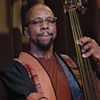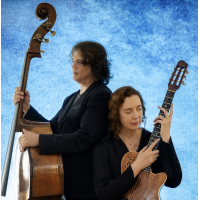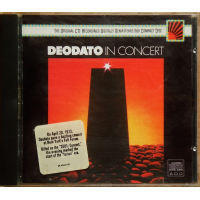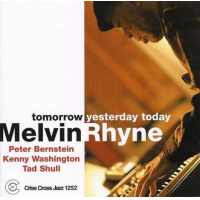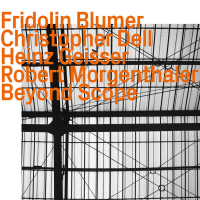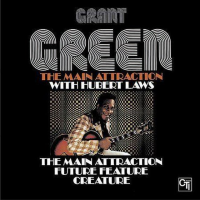Home » Jazz Articles » Liner Notes » Yoron Israel: Visions – Tribute to Stevie Wonder
Yoron Israel: Visions – Tribute to Stevie Wonder
Not only have the easy-to-love melodies of Stevland Hardaway Morris (b. May 13, 1950) become staples of the modern American soundtrack, they naturally trigger our most fundamentally human physical response: the graceful, unified movement of body and soul. The rhythmic impulse Yoron Israel and each member of his quartet (pianist Laszlo Gardony, saxophonist Lance Bryant, bassist Ron Mahdi) locate and emphasize in their recording is uplift derived from the tunes' fundamental flow.
"The more closely I listen to Stevie, the more I understand he's on par with Charlie Parker and John Coltrane," Israel says. "He's involved with a different genre, in a different period, but shares that same essence of musicality. With George Gershwin, too." This foursome helps Wonder's songs breathe, but that spark of life is embedded within them, which makes the band's beautifully sensitive interpretations seem effortless and memorable, as if this is how these songs have always sounded.
Well, that isn't quite so. Until now, "Another Star" has not so obviously been akin to a mid-tempo ballad as performed by, say, Coltrane's classic quartet of the mid 1960s. But as Israel lays out its quietly intricate momentum and Bryant so mellowly launches the theme, while Gardony comps brightly and Mahdi plucks his plangent tones, the kinship is evident. Similarly, the samba basis of "Bird of Beauty" as Stevie Wonder recorded it in 1974 on Fulfillingness' First Finale is not obvious, and even when Yoron smacks the backbeat of his introduction here, we expect something else. However, when he falls in with Gardony, Mahdi and guest guitarist Thaddeus Hogarth to support Bryant's gleaming soprano sax flight, the Brazilian breeze is palpable, and the arrangement's counter-rhythmic tensions pull as inexorably as fulfillingness itself.
For Israel, this is as the songs have always sounded, because, as he says, "This is how I've been hearing these songs in the back of my mind for years. These are songs I grew up with, and I'd started experimenting with them, playing 'Creepin'' and 'Where Were You' on gigs long before I began to think about this recording. I always knew I would record 'Bird of Beauty' when I had a chance. And about four years ago I had a concert project at Berklee"—Israel is Assistant Chair and Professor of Percussion at Berklee College of Music, Boston; he's taught there since 2000—"with instrumentation like what was used in the church I went to growing up: a piano, organ and drums trio. At the time it came to me again that this might be a good format to apply to some of Stevie's things."
Furthermore: "This record," Yoron continues, "parallels my personal life, in terms of the vision aspect. I recently became the full-time dad of my three children, after having been a father from afar for 10 years. But I'd always had, over all that time, a vision—a strong image, which was with me daily—that eventually I would have custody of them. The idea of visualizing something, having a vision as a start of it becoming a reality, and it becoming a reality, came together as I formulated this recording."
Such visions are often long in the process of realization, so it's not much of a stretch to suggest the basis of Israel's recording, his overall music and career goes back to his upbringing in Chicago, plus all that's happened since. Born in 1966, Yoron came up under the influence of that city's rich gospel heritage, its swing-to-bop mainstream (via teachers including Marshall Thompson, Wilbur Campbell and Robert Shy) and its avant-garde leaning Association for the Advancement of Creative Musicians (including instruction from drummer Thurman Barker and being in bands with saxophonist Ernest Dawkins).
"I'm so appreciative that there was never an expectation in Chicago that people pigeonhole themselves," he says. "The idea was if you were a musician you should be able to play anything. So jazz is, yes, my passion, my love—but I knew I might get a call to play r&b, gospel, Latin or free-style, and if I did I wanted to be able to handle the music in an authentic way."
Authentic is the right one-word description of this program. "All in Love is Fair," for which Israel picks up his brushes, is a sadder-but-wise statement so affecting its message is as good as etched in words. The dreamy yet insistent feeling of "Creepin'" is evoked by Israel and especially Gardony in a multi-faceted solo, followed by Bryant's straightforward choruses.
The coherence of the musicians, by the way, is evident in this as well as every other track on the album. Israel was a Chicago high school senior when he met Bryant at a jam session, and the two connected again more than a decade later when they both resided in Brooklyn's Fort Greene neighborhood. Israel and Gardony met at Berklee and have collaborated in groups one or the other has led for a dozen years. Ron Mahdi is also a Berklee faculty member, as are Thaddeus Hogarth and Larry Roland, the spoken word artist Israel commissioned to create a poem from his relatively prosaic thoughts. I suspect Israel understands that Wonder is a jazz composer, directly channeling the American idiom, because he himself is a man in touch with the music of here and now as well as the "what if?" and "just maybe." For example: "You Are the Sunshine of My Life," which whenever it's played pleases anyone in earshot, receives slight modification from Israel, other than being put in the unusual meter of 7/4.
In contrast, Israel sets "Contusion" in what he considers "a McCoy Tyner / Elvin Jones" kind of swing, transforms it during his duo with Gardony into a Latin-flavor episode, arrives at a loose, African-inflected underpinning to Bryant's improvisation, then enforces Zappa-like tight ensemble play for the concluding passages on which he drums up a storm. Yoron is also firmly propulsive on "Passionate Raindrops" (from Wonder's 2005 album A Time to Love) accenting Hogarth's harmonica with and without the support of Bryant's soprano sax, and provides accents plus bouyancy to "Where Were You When I Needed You Last Winter," on which Bryant, then Gardony explore where "you" might have been and why it mattered.
Vision ends with a reprise of "Vision." Larry Roland's voice, Bryant's horn, Gardonay's chords, Mahdi's throb and Israel's rim-shots reassert the promise and purpose of this music. "To me, it's about touching people, making a difference," Yoron contends. "If they hear something that makes them smile, that's what it's all about. Healing comes through that, too. Take five minutes a day to focus on an emotion that's positive, and something is healed. It may be just a small part of what troubles you, but every little bit helps. That's my vision." It's also Stevie Wonder's, and if you smile when you listen it will be your vision, too.
Liner Notes copyright © 2026 Howard Mandel.
Visions – Tribute to Stevie Wonder can be purchased here.
Contact Howard Mandel at All About Jazz.
Howard is a Chicago-born writer, editor, author, arts reporter for National Public Radio, consultant and videographer. Visit Howard at howardmandel.com.
Track Listing
Another Star; Bird of Beauty; All In Love Is Fair; Creepin'; Visions; You Are The Sunshine Of My Life; Contusion; Passionate Raindrops; Where Were You When I Needed You; Visions Reprise.
Personnel
Album information
Title: Visions – Tribute to Stevie Wonder | Year Released: 2012 | Record Label: Self Produced
Tags
PREVIOUS / NEXT
Yoron Israel Concerts
Support All About Jazz
 All About Jazz has been a pillar of jazz since 1995, championing it as an art form and, more importantly, supporting the musicians who make it. Our enduring commitment has made "AAJ" one of the most culturally important websites of its kind, read by hundreds of thousands of fans, musicians and industry figures every month.
All About Jazz has been a pillar of jazz since 1995, championing it as an art form and, more importantly, supporting the musicians who make it. Our enduring commitment has made "AAJ" one of the most culturally important websites of its kind, read by hundreds of thousands of fans, musicians and industry figures every month.





